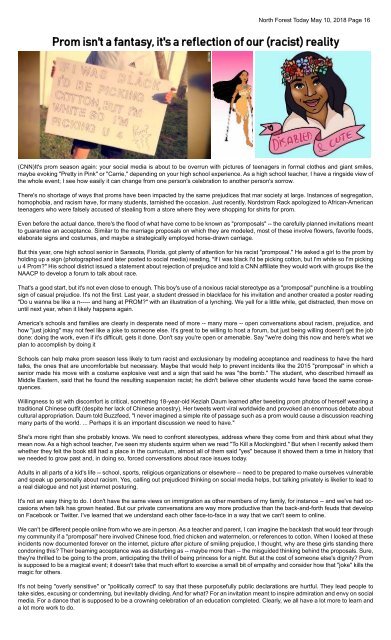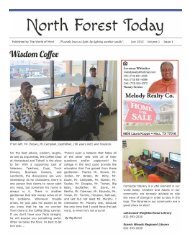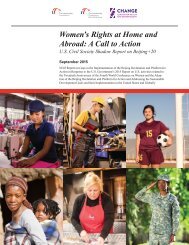The Mighty Anchor
You also want an ePaper? Increase the reach of your titles
YUMPU automatically turns print PDFs into web optimized ePapers that Google loves.
North Forest Today May 10, 2018 Page 16<br />
Prom isn't a fantasy, it's a reflection of our (racist) reality<br />
(CNN)It's prom season again: your social media is about to be overrun with pictures of teenagers in formal clothes and giant smiles,<br />
maybe evoking "Pretty in Pink" or "Carrie," depending on your high school experience. As a high school teacher, I have a ringside view of<br />
the whole event; I see how easily it can change from one person's celebration to another person's sorrow.<br />
<strong>The</strong>re's no shortage of ways that proms have been impacted by the same prejudices that mar society at large. Instances of segregation,<br />
homophobia, and racism have, for many students, tarnished the occasion. Just recently, Nordstrom Rack apologized to African-American<br />
teenagers who were falsely accused of stealing from a store where they were shopping for shirts for prom.<br />
Even before the actual dance, there's the flood of what have come to be known as "promposals" -- the carefully planned invitations meant<br />
to guarantee an acceptance. Similar to the marriage proposals on which they are modeled, most of these involve flowers, favorite foods,<br />
elaborate signs and costumes, and maybe a strategically employed horse-drawn carriage.<br />
But this year, one high school senior in Sarasota, Florida, got plenty of attention for his racist "promposal." He asked a girl to the prom by<br />
holding up a sign (photographed and later posted to social media) reading, "If I was black I'd be picking cotton, but I'm white so I'm picking<br />
u 4 Prom?" His school district issued a statement about rejection of prejudice and told a CNN affiliate they would work with groups like the<br />
NAACP to develop a forum to talk about race.<br />
That's a good start, but it's not even close to enough. This boy's use of a noxious racial stereotype as a "promposal" punchline is a troubling<br />
sign of casual prejudice. It's not the first. Last year, a student dressed in blackface for his invitation and another created a poster reading<br />
"Do u wanna be like a n----- and hang at PROM?" with an illustration of a lynching. We yell for a little while, get distracted, then move on<br />
until next year, when it likely happens again.<br />
America's schools and families are clearly in desperate need of more -- many more -- open conversations about racism, prejudice, and<br />
how "just joking" may not feel like a joke to someone else. It's great to be willing to host a forum, but just being willing doesn't get the job<br />
done: doing the work, even if it's difficult, gets it done. Don't say you're open or amenable. Say "we're doing this now and here's what we<br />
plan to accomplish by doing it<br />
Schools can help make prom season less likely to turn racist and exclusionary by modeling acceptance and readiness to have the hard<br />
talks, the ones that are uncomfortable but necessary. Maybe that would help to prevent incidents like the 2015 "promposal" in which a<br />
senior made his move with a costume explosive vest and a sign that said he was "the bomb." <strong>The</strong> student, who described himself as<br />
Middle Eastern, said that he found the resulting suspension racist; he didn't believe other students would have faced the same consequences.<br />
Willingness to sit with discomfort is critical, something 18-year-old Keziah Daum learned after tweeting prom photos of herself wearing a<br />
traditional Chinese outfit (despite her lack of Chinese ancestry). Her tweets went viral worldwide and provoked an enormous debate about<br />
cultural appropriation. Daum told Buzzfeed, "I never imagined a simple rite of passage such as a prom would cause a discussion reaching<br />
many parts of the world. ... Perhaps it is an important discussion we need to have."<br />
She's more right than she probably knows. We need to confront stereotypes, address where they come from and think about what they<br />
mean now. As a high school teacher, I've seen my students squirm when we read "To Kill a Mockingbird." But when I recently asked them<br />
whether they felt the book still had a place in the curriculum, almost all of them said "yes" because it showed them a time in history that<br />
we needed to grow past and, in doing so, forced conversations about race issues today.<br />
Adults in all parts of a kid's life -- school, sports, religious organizations or elsewhere -- need to be prepared to make ourselves vulnerable<br />
and speak up personally about racism. Yes, calling out prejudiced thinking on social media helps, but talking privately is likelier to lead to<br />
a real dialogue and not just internet posturing.<br />
It's not an easy thing to do. I don't have the same views on immigration as other members of my family, for instance -- and we've had occasions<br />
when talk has grown heated. But our private conversations are way more productive than the back-and-forth feuds that develop<br />
on Facebook or Twitter. I've learned that we understand each other face-to-face in a way that we can't seem to online.<br />
We can't be different people online from who we are in person. As a teacher and parent, I can imagine the backlash that would tear through<br />
my community if a "promposal" here involved Chinese food, fried chicken and watermelon, or references to cotton. When I looked at these<br />
incidents now documented forever on the internet, picture after picture of smiling prejudice, I thought, why are these girls standing there<br />
condoning this? <strong>The</strong>ir beaming acceptance was as disturbing as -- maybe more than -- the misguided thinking behind the proposals. Sure,<br />
they're thrilled to be going to the prom, anticipating the thrill of being princess for a night. But at the cost of someone else's dignity? Prom<br />
is supposed to be a magical event; it doesn't take that much effort to exercise a small bit of empathy and consider how that "joke" kills the<br />
magic for others.<br />
It's not being "overly sensitive" or "politically correct" to say that these purposefully public declarations are hurtful. <strong>The</strong>y lead people to<br />
take sides, excusing or condemning, but inevitably dividing. And for what? For an invitation meant to inspire admiration and envy on social<br />
media. For a dance that is supposed to be a crowning celebration of an education completed. Clearly, we all have a lot more to learn and<br />
a lot more work to do.














